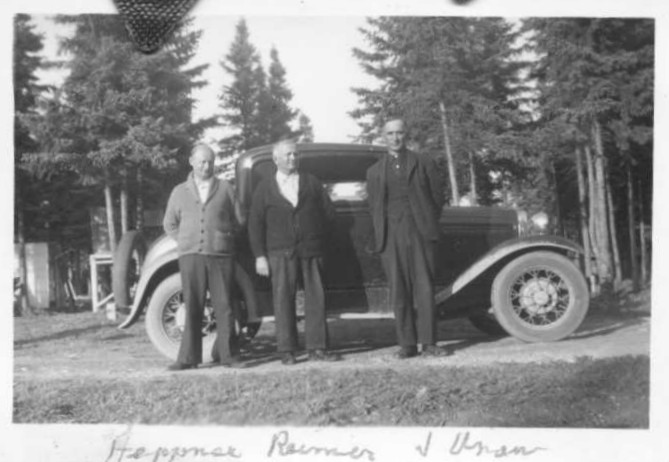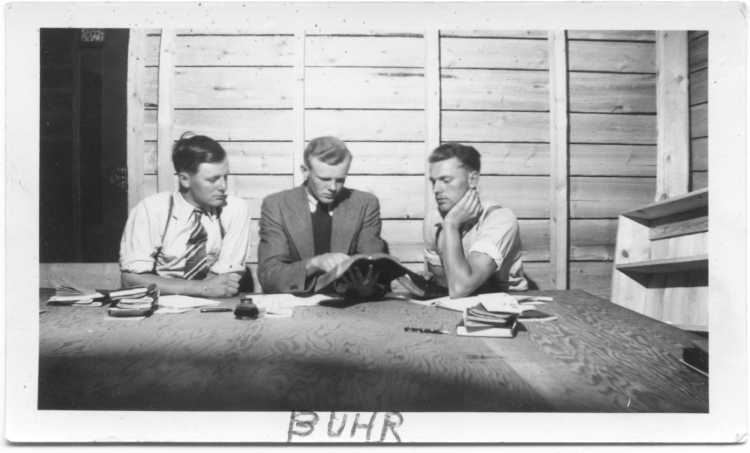Page
1 | Page 2 | Back
to Life at Camp Page
The
Manual of Instruction for the alternative service work
program encouraged COs to hold religious service. While the government
would not pay for any of these services, “full cooperation should
be extended,” the manual said, “to any denomination wishing to send
in a Minister at their own expense. This cooperation may take the
form of providing automobile transport into the camp and free lodging
while there.”
Also,
if the camp were near enough to church, “truck transportation for
such men should be provided for this purpose.” If a minister wished
to stay for an extended period of time, he would have to pay for
his meals, but he had the option of working a few hours a day instead.
This
open policy meant, as Abram L. Ens remembers, that “there were no
restrictions about practicing your faith. Various groups had various
activities. There were five Hutterite boys who had prayer meetings
nightly in the recreation hall. Some other groups practiced gospel
singing.” [ASM, 229-231]
 Wilson
Hunsberger remembers that there was a range of COs from different
denominations at the camp and they did not all worship together. Wilson
Hunsberger remembers that there was a range of COs from different
denominations at the camp and they did not all worship together.
The
type and frequency of services in each depended on the men.
 David Jantzi explains that the COs at his camp took turns being
in charge of the worship services.
David Jantzi explains that the COs at his camp took turns being
in charge of the worship services.
 Ed
Bearinger enjoyed the services that were held outside on a hill
under some trees. Ed
Bearinger enjoyed the services that were held outside on a hill
under some trees.
The
COs in Jasper National Park had a variety of spiritual
activities. Peter A. Unger relates some of them.
“A
very important factor in our camp life was the devotional exercises.
There were those who had had Bible school training and did very
well as spiritual leaders. There were midweek Bible studies with
testimonies and prayer sessions. We also had Sunday morning services.
The singing was a cappella [without instruments]. It
was robust singing. There were several who had accordions. There
may have been other instruments. This spiritual emphasis inspired
a goodly number to read the Scriptures and devote themselves to
prayer.” [ASM, 210-218]
At
the Kananaskis Forest Experimental Station in Seebe, Alberta, near
Jasper National Park, Klaas Isaac spent two years building roads
and doing forestry work. The services there led to opportunities
to share the Christian message.
"Our
camp being situated between two POW camps, we frequently rubbed
shoulders with the Canadian Army guard and also worked at the
same work the German prisoners of war did when they came out of
their camps. This often provided opportunities to witness for
the cause of peace and for the Word of God. Some of the Veterans'
Guard would also attend our Gospel services held on Sunday mornings
and week-day evenings." [ASM, 22]
 |
 |
| Ministers visiting the young men at Clear Lake, Riding Mountain
National Park. |
Henry Warkentin, Alvin Buhr, and Jake Froese in recreation
hall studying the Bible. |
The
system of visiting
ministers exposed the COs to a different styles of preaching.
In the early days of the alternative service work system, Erwin
R. Giesbrecht remembers, the ministers needed as much support as
the COs.

“Riding
Mountain Park had three camps. The churches had one minister to
serve the camps, which meant that we could expect to have evening
devotions every third day. Each minister stayed about four weeks.
We found that possibly the ministers were caught as unprepared
in their duties as any. I believe for some it must have been the
first English sermon they preached and prayed. There were ministers
by the name of Rev. Friesen, Rev. Reimer, and Rev. Epp, and possibly
some visits by others. They sure were different from one another.
One of the boys told me he had never heard a sermon preached by
memory as a speech. He could hardly call that a sermon. Most of
the ministers read their thoughts and meditations off a script.”
[ASM, 75-93]
 Elias Brubacher felt that
the spiritual life at the camp where he served was very good.
In one case a speaker was stranded at the camp for a week.
The young COs enjoyed listening to him speak about a wide range
of topics.
Elias Brubacher felt that
the spiritual life at the camp where he served was very good.
In one case a speaker was stranded at the camp for a week.
The young COs enjoyed listening to him speak about a wide range
of topics.
Page
1 | Page 2 | Back
to Life at Camp Page |


